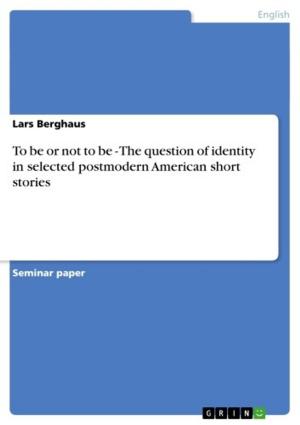Spiritual Isolation in 'The Ballad of the Sad Café'
A sad Parable on the American South by Carson McCullers
Nonfiction, Entertainment, Drama, Anthologies| Author: | Juliane Hanka | ISBN: | 9783638556446 |
| Publisher: | GRIN Publishing | Publication: | October 17, 2006 |
| Imprint: | GRIN Publishing | Language: | English |
| Author: | Juliane Hanka |
| ISBN: | 9783638556446 |
| Publisher: | GRIN Publishing |
| Publication: | October 17, 2006 |
| Imprint: | GRIN Publishing |
| Language: | English |
Seminar paper from the year 2006 in the subject American Studies - Literature, grade: 1.0, Dresden Technical University (Institut für Anglistik/Amerikanistik), course: Images of the American South, 22 entries in the bibliography, language: English, abstract: This paper is going to examine how the southern-born writer Carson McCullers creates the lonely picture of an individual living in hopeless spiritual isolation in a southern town. The South used to be a rural area with its own distinctive culture and a 'strong folk tradition, preserved mainly through music and language' (Forkner 91). It will be discussed how this image had to give way to the new reality of the South by the time of the 1940s. It had turned into an interchangeable urbanized society which excluded the individual which did not correspond to southern norms. Furthermore, by analyzing the main characters of The Ballad of the Sad Café, the paper points out the unique dreariness of McCullers' visions, looking for reasons in her childhood as well as in her adult life. Focusing on her work The Ballad of the Sad Café, the paper underlines that McCullers was always questioning the national identity of 20th century America in general, and the transforming southern society in particular. Further on, it discusses the crucial difference between Carson McCullers' and William Faulkner, who is known as the most recognized writer of her time. By interpreting the novelette The Ballad of the Sad Café, the paper is going to highlight the topic McCullers was most concerned about: The spiritual isolation of the individual. An isolation which is deeply rooted within a person who does not fit into the narrow-minded and prefabricated picture of the stereotypical southern society. Finally, my paper emphasizes Carson McCullers' concern with gender and behavioral concepts in the early 20th century, which she turned upside down in order to uncover the artificiality of the southern myth and its rigid moral conceptions.
Seminar paper from the year 2006 in the subject American Studies - Literature, grade: 1.0, Dresden Technical University (Institut für Anglistik/Amerikanistik), course: Images of the American South, 22 entries in the bibliography, language: English, abstract: This paper is going to examine how the southern-born writer Carson McCullers creates the lonely picture of an individual living in hopeless spiritual isolation in a southern town. The South used to be a rural area with its own distinctive culture and a 'strong folk tradition, preserved mainly through music and language' (Forkner 91). It will be discussed how this image had to give way to the new reality of the South by the time of the 1940s. It had turned into an interchangeable urbanized society which excluded the individual which did not correspond to southern norms. Furthermore, by analyzing the main characters of The Ballad of the Sad Café, the paper points out the unique dreariness of McCullers' visions, looking for reasons in her childhood as well as in her adult life. Focusing on her work The Ballad of the Sad Café, the paper underlines that McCullers was always questioning the national identity of 20th century America in general, and the transforming southern society in particular. Further on, it discusses the crucial difference between Carson McCullers' and William Faulkner, who is known as the most recognized writer of her time. By interpreting the novelette The Ballad of the Sad Café, the paper is going to highlight the topic McCullers was most concerned about: The spiritual isolation of the individual. An isolation which is deeply rooted within a person who does not fit into the narrow-minded and prefabricated picture of the stereotypical southern society. Finally, my paper emphasizes Carson McCullers' concern with gender and behavioral concepts in the early 20th century, which she turned upside down in order to uncover the artificiality of the southern myth and its rigid moral conceptions.















